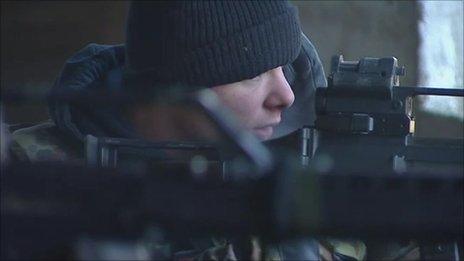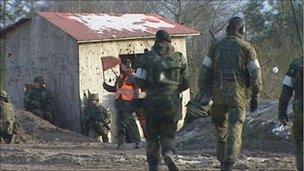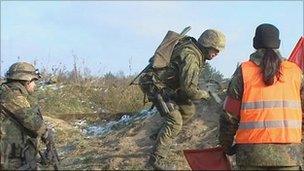German army prepares for new global role
- Published

German troops have been prepared to engage with danger more actively
The last batch of German conscripts are starting their spell in the armed forces - part of the biggest change in the German military since it was re-formed after World War II.
The armed forces, the Bundeswehr, are to be reduced in number from 240,000 to 185,000, as Germany focuses on professional military roles around the world and abandons conscription.
On Lueneburg heath in northern Germany, a mock-up of an Afghan village prepares young German soldiers for one such role.
Squads of men dart down alleyways between old shipping containers, shooting live ammunition at targets that appear in doorways.
Up pops a board depicting a bearded man, and the soldiers raise their weapons and fire until the target falls back to the ground.
New world
The German presence in Afghanistan is one sign of how the Bundeswehr is throwing off the constraints imposed after its disgrace and defeat in 1945. The end of conscription, due in July, is another.
After the end of World War II, the idea was that a military of the people would not bow easily to another dictator.
Inside and outside Germany the mantra was: "No German boots on foreign soil." It was also part of the constitution. German forces would be purely defensive, and defensive at the border.
But in the new world, two decades after the end of communism, the military is being re-formed. Conscription is due to disappear in July as the military prepares to step a little further afield.

For nearly 50 years the rule was: "No German boots on foreign soil"
German troops have found themselves being drawn into more aggressive, more active roles in Afghanistan. They went initially to defend civilians on construction projects - but found that "defence" against hostile people intent on attack might mean something more than waiting for the other to open fire.
Nearly 50 German soldiers and police have been killed in Afghanistan, and as German troops have become targets so they have been prepared to engage with danger much more actively.
Genocide guilt
The change started in the 1990s, when Germany became involved in the Balkans as part of the Nato operation.
That was seen at home as Germany's rightful role because of its own guilt over genocide. Some Germans thought it their duty to prevent what Germany itself had perpetrated nearly half a century earlier.

Germany is rethinking its role and becoming a "normal" military power
And then came Afghanistan, where German troops answered American calls for help. Others would do the real fighting in the contested south of the country, but Germany would protect construction workers in the north.
It did not work out that way. Germans felt compelled to change their strategy after they were accused of being over-cautious and of disliking foot patrols, according to defence expert Dr Constanze Stelzenmueller.
"Crossing the threshold to active combat was an important psychological moment," Dr Stelzenmueller said.
"For a long time there was a strong wish in German public opinion to believe that whereas the Americans, the Canadians and the British were fighting terrorists in the south, we in the north were protecting development workers and protecting Afghans and therefore we were more peaceful and more successful."
But the Taliban saw that as a weakness, she says, and carried out increasingly vicious attacks until German forces learned to retaliate.
Punching with care
Hellmut Koenigshaus, who serves as defence commissioner of the German parliament, told the BBC that in the past Germans had supplied money and not people to international operations - spilling their cash but not their blood.
Now the country has decided to get more involved partly because that is what its allies want.
"We can't say, as we did before, that nobody wants German boots on their territory," he says.
"Even Israelis have said that they would prefer German soldiers in peacekeeping missions in the region. We were not prepared to do this at that time but in future we will be a normal partner among others like France or Britain."
Behaving like a "normal" military power, however, will not involve going it alone.
Germany, aware of continuing sensitivities, will act only with other forces from Nato or the European Union. It will not provide military muscle to back up economic interests.
German forces have looked increasingly awkward in the modern age. After the fall of the Berlin Wall, the idea of masses of soldiers stuck in barracks ready to confront the Red Army seemed an anomaly.
While the original idea of conscription was to build a military that reflected wider society, German leaders now feel that democracy is so embedded that constraints on its role can be loosened.
The economic giant will start to punch its weight - though carefully.
According to the thinking in Berlin, there will be more German boots on foreign soil, but they will tread with sensitivity.
- Published3 January 2011